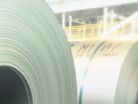Anglo American ties up with Nippon Steel on decarbonisation

Anglo American and Nippon Steel Corporation have signed a memorandum of understanding to work together to accelerate the transition to lower carbon steelmaking.
Peter Whitcutt, CEO of Anglo American’s Marketing business, said the agreement is an important component of Anglo American’s approach to collaborating with our customers and helping to shape a greener future for the backbone of global infrastructure – steel.
"By working together, we can drive towards system-level decarbonisation and pave the way for sustainable steelmaking, underpinning the steel industry’s full potential as an enabler of society’s wider economic prosperity and social development," he said.
Anglo American supplies steelmaking coal and iron ore to steel customers around the world. As part of this agreement, the two companies will research ways to optimise premium lump ore produced by Anglo American’s mines to decrease emissions via the traditional blast furnace (BF) steelmaking process.
The project will also focus on studying the use of Anglo American’s iron ore in the more carbon-efficient direct reduction iron (DRI) steelmaking method. DRI is estimated to generate significantly lower emissions than the more prevalent steelmaking routes of blast furnaces and basic oxygen furnaces.
Whitcutt added that its product portfolio focuses on future-enabling metals and minerals that are critical to the transition to a lower carbon world.
"Working with our customers is one of the cornerstones of our efforts to reduce emissions across our entire value chain – the majority of which are associated with the downstream use of our products in steelmaking," he added.
"We look forward to collaborating on this important work with Nippon Steel, with whom we have a relationship that spans more than five decades, combining our expertise for more efficient and less carbon intensive production processes.”
In October 2021, the publication of Anglo American’s Climate Change Report set out an ambition to reduce Scope 3 emissions by 50% by 2040, building on a pre-existing commitment to reach carbon neutrality across its operations by the same year.
The steel value chain was recognised as key to achieving this ambition, with the majority of Anglo American’s Scope 3 emissions linked to materials sold into the industry.
The report outlined a holistic approach to decarbonisation, predicated across multiple levers, including developing high-quality products to feed into more efficient and less carbon-intensive production processes, driving efficiency and minimising emissions, and working with customers to accelerate decarbonisation efforts.
In March 2021, Nippon Steel announced its "Nippon Steel Carbon Neutral Vision 2050," the company's flagship initiative to respond to climate change.
Through this programme, shaped around the transition to innovative and more sustainable production methods, and the adoption of innovative technologies, Nippon Steel aims to reduce emissions by 30% by 2030 and achieve carbon neutrality by 2050.
- Glencore Results: What Next After Rio Tinto Merger Collapse?Supply Chain & Operations
- How Sandvik & Atlas Salt Deal Will Make US Roads SaferSourcing & Procurement
- How Did Iron Ore and Nickel Giant Vale Perform in 2025?Supply Chain & Operations
- Mexico's Move to Build Critical Minerals Supply ChainsSupply Chain & Operations



